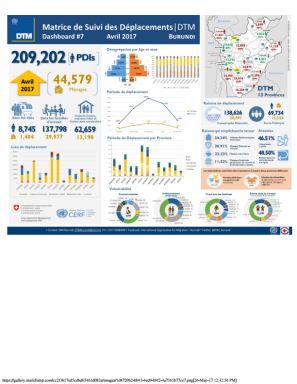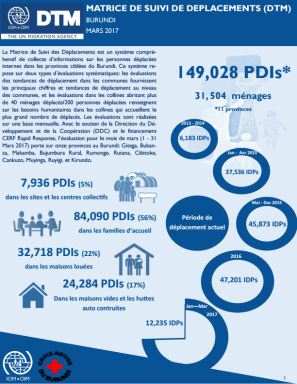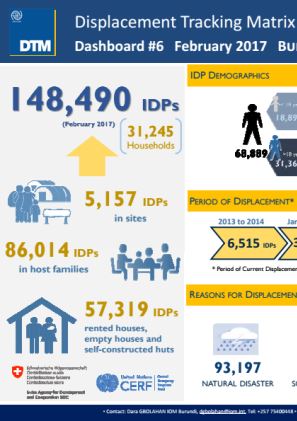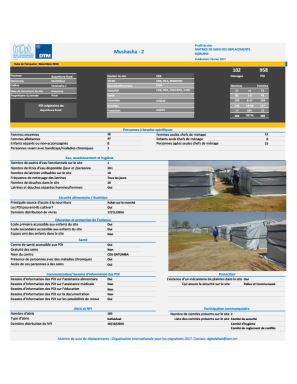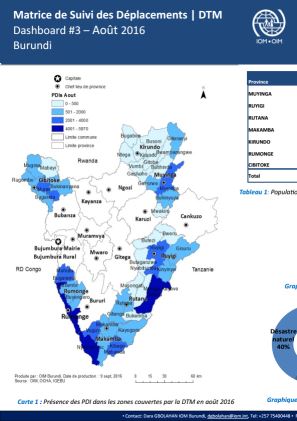-
Countries
-
Data and Analysis
-
Special Focus
-
Crisis Responses
Burundi
Burundi
IDPs tracked
Displacement Movements
8,100
IDMC 2023
Data collection round
About Burundi
In response to the great need for information on internally displaced persons (IDPs), their humanitarian profile and needs, as identified by the humanitarian community and the Burundian authorities, the International Organization for Migration (IOM) implemented DTM since 2015 to effectively and systematically track and assess internal population flows in Burundi and therefore provide reliable information on the current situation of IDPs.
The Displacement Tracking Matrix monitors IDPs on a national level and to identify their humanitarian needs. The DTM’s main objective is to maintain a comprehensive system of data collection and sharing on IDPs. The project relies on the synergy between IOM's DTM and the Burundi Red Cross (BRC), who are jointly responsible for data collection on internally displaced persons. The collected data includes figures on displacement, as well as displacement centres, provenance locations, approximate duration of displacement and humanitarian needs of the displaced populations. The information collected at various levels contributes to the construction of an overall profile of the displaced population in targeted provinces, which can then be used by the government and the humanitarian partners in order to protect, assist and advocate for IDPs.
In November 2018, DTM Burundi also began to collect data on movement at unofficial points of transit on the Burundi - Tanzania border. The information collected at the flow monitoring points enable the government, humanitarian partners and policy stakeholders, to understand migration trends on the national and regional levels.
Contact
DTMBurundi@iom.int
Current Donors
- PRM
- BHA
- Japan
- Republic of Korea
- Swiss (SDC)
- GFFO
Burundi — Rapport de déplacement 10 (Mai 2017)
214 895 Personnes Déplacées Internes (PDI), dans 46 137 ménages, ont été identifiées. 66% des déplacements sont dûs à des désastres naturels, 33% à la situation socio-politique.
Jun 21 2017
Burundi — Rapport de déplacement 10 (Mai 2017)
Burundi — Displacement Report 10 (May 2017)
This displacement report covers the 15 provinces of Burundi.
Jun 21 2017
Burundi — Displacement Report 10 (May 2017)
Burundi — Displacement Dashboard 7 (April 2017)
DTM recorded 209,202 IDPs comprising 44,578 households during the period covered.
May 25 2017
Burundi — Displacement Dashboard 7 (April 2017)
Burundi — Dashboard des déplacements 7 (Avril 2017)
DTM Burundi a identifié 209 202 PDI comprises dans 44 579 ménages. 8 745 PDI vivent dans des camps de déplacés, 137 798 PDI vivent avec des familles hôtes, 62 659 PDI vivent dans des maisons louées.
Burundi — Rapport de déplacement 9 (Mars 2017)
La Matrice de Suivi des Déplacements est un système compréhensif de collecte d’informations sur les personnes déplacées internes dans les provinces ciblées du Burundi.
May 09 2017
Burundi — Rapport de déplacement 9 (Mars 2017)
Burundi — Displacement Report 9 (March 2017)
By March 2017 DTM identified 149,028 IDPs in 31,504 households across 11 provinces in Burundi. 56% of the displaced population was found to be living with host families.
May 09 2017
Burundi — Displacement Report 9 (March 2017)
Burundi — Dashboard des déplacements 6 (Février 2017)
En février 2017, DTM a identifié 148 490 PDI (31 245 ménages) dans onze provinces. 5 157 PDI vivent des des dites de déplacements, 86 014 PDI vivent dans des familles d'accueil, et 57 319 PDI vivent dans des maisons louées.
Burundi — Rapport de déplacement 8 (Janvier 2017)
La Matrice de Suivi des Déplacements est un système compréhensif de collecte d’informations sur les personnes déplacées internes dans les provinces ciblées du Burundi.
Burundi — Displacement Report 8 (January 2017)
DTM Burundi recorded 61,784 individuals comprising 13,210 families during the period covered. Of these 19% were children, 10% were elderly and 5% were pregnant women. These DTM statistics covered the 3 provinces of Bubanza, Cankuzo and Gitega.
Mar 13 2017
Burundi — Displacement Report 8 (January 2017)
Burundi — Displacement Dashboard 6 (February 2017)
DTM recorded 148,490 IDPs comprising 31,245 households during the period covered. Of these 5,157 are in displacement sites, 86,014 are living with host families and 57,319 are living in rented houses and self-constructed huts.
Burundi — Dashboard des déplacements 5 (Décembre 2016)
En décembre 2016, DTM a identifié 141 221 258 PDI (29 245 ménages) dans onze provinces. La plupart des PDI résident dans la province de Gitega (34 584 PDI).
Burundi — Mushasha 2 Site Profile (December 2016)
The site profile was conducted for a camp in the town of Mutimbuzi, Rural Bujumbura. 958 IDPs comprising 102 households were present at the camp during the period of survey. There was one functional water service on site which could provide 20 liters of water per person per day.
Burundi — Mushasha 1 Site Profile (December 2016)
The site profile was conducted for a camp in the town of Mutimbuzi, Rural Bujumbura. 2,032 IDPs comprising 303 households were present at the camp during the period of survey. There were two functional water services on site which could provide 20 liters of water per person per day.
Burundi — Rapport de déplacement 7 (Novembre 2016)
La Matrice de suivi des Déplacements (DTM en anglais) a été lancée au Burundi en Septembre 2015 par l’Organisation Internationale pour les Migrations pour suivre et évaluer efficacement de manière systématique les mouvements de population à l’intérieur du pays.
Burundi — Displacement Dashboard 5 (December 2016)
DTM recorded 141,221 IDPs. Of these 58% were displaced as a result of natural disasters and 42% were displaced as a result of the socio-political situation.
Burundi — Cashi, Gitaza, Mushasha 1 and Mushasha 2 Site Profiles (October — December 2016)
In Cashi, DTM recorded 1,063 IDPs (135 households) in October 2016. This number did not change in the follollowing month. The numbers did not change in the case of Gitaza either during the same months, where DTM recorded 1,269 IPDs (182 households).
Burundi — Dashboard des déplacements 4 (Octobre 2016)
En octobre 2016, DTM a identifié 102 258 PDI (21 606 ménages) dans neuf provinces. La plupart des PDI résident dans la province de Gitega (31 610 PDI soit 7 014 ménages).
Burundi — Displacement Report 7 (November 2016)
130,956 persons are reported to be internally displaced. This represents a 28% increase from previous month (October 2016) and an overall peak in 2016. There were around 14,900 IDPs in January 2016. 11 out of 18 provinces were covered by the DTM.
Nov 30 2016
Burundi — Displacement Report 7 (November 2016)
Burundi — Displacement Dashboard 4 (October 2016)
DTM recorded 102,258 IDPs (21,606 households) in nine provinces. Most IDPs were found in Gitega (31,610 IDPs or 7,014 households). 32% of IDPs had been displaced since January–April 2015, 33% since after July 2015 and 31% since May–July 2015. Another 4% had been displaced since 2013–2015.
Burundi — Rapport de déplacement 6 (Septembre 2016)
En septembre 2016, les données ont été collectées sur les personnes déplacées internes dans sept (7) provinces avec des informations fournies par 314 informateurs-clés dans les provinces ciblées.
Burundi — Displacement Report 6 (September 2016)
57,926 IDPs (12,254 households) have been identified by the DTM in September 2016 in the 7 targeted provinces. The number of persons displaced by natural disasters has increased by 15% between August and September 2016.
Sep 30 2016
Burundi — Displacement Report 6 (September 2016)
Burundi — Dashboard des déplacements 3 (Août 2016)
En août 2016, DTM a identifié 59 758 PDI dans sept provinces. La plupart des PDI résident dans la province de Makamba (13 255 PDI soit 2 651 ménages).
Burundi — Displacement Dashboard 3 (August 2016)
DTM recorded 59,758 IDPs (12,472 households) in seven provinces. Most IDPs were found in Makamba (13,255 IDPs or 2,651 households). 58% of IDPs reported socio-political reasons for their displacement and 40% were displaced by natural disasters. 2% fled for 'other' reasons.
Aug 31 2016
Burundi — Displacement Dashboard 3 (August 2016)
Burundi — Rapport de déplacement 5 (Juillet 2016)
Pendant le mois de juillet 2016, les données ont été collectées sur les personnes déplacées internes au sein de sept (7) provinces avec des informations fournies par 1,774 informateurs-clé dans les provinces ciblées. Les données des collines ont été collectées dans six (6) provinces
Pagination
Pagination
- First page
- Previous page
- 1
- 2
- 3
- 4
- 5
- 6
- 7
- 8





